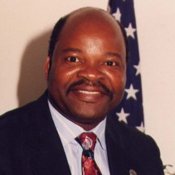Stephen Ekunwe, a biology professor at Jackson State University, has recently been named a fellow of the African Scientific Institute. The ASI Fellows association is an international group of accomplished academics, researchers, and business people in the fields of science and technology. The association elects individuals to membership and recognizes each fellow for excellence in his or her field and gives awards for distinguished achievement. There are currently 553 ASI Fellows from 41 countries.
ASI recognized Ekunwe for his achievements in cellular and molecular biology, especially in colon and prostate cancer research with the edible medicinal herb, Ocimum gratissimum. He has researched microbial molecular genetics, bioremediation and Escherichia coli, the E. coli bacterium. He has also worked as a molecular geneticist, worked on developing wound-healing chemicals and researched soil-contaminating bacteria.
Ekunwe was born in Nigeria in 1952, the second of seven children of Gabriel and Mary Ekunwe. His mother was a self-employed businesswoman, and his father worked for the Nigerian public-health department treating leprosy patients. Watching his father on the job was what first motivated Ekunwe to go into the field of health research and disease treatment., according to his profile on the website for the Multicultural Environmental Leadership Development Initiative.
After leaving Nigeria to further his education in the U.S, Ekunwe completed his undergraduate and graduate studies in biology at Jackson State University in 1985 and 1990, respectively, and earned a doctorate in microbiology and cell and molecular biology from Michigan State University in 1998. Before coming to JSU, Ekunwe worked as an instructor at Tougaloo College, a summer faculty research associate at Lawrence Berkeley Laboratory in Berkeley, Calif., and as a teaching assistant at Michigan State University in East Lansing, Mich. Ekunwe joined the Jackson State faculty in 1998.
More stories by this author
- New CSET Atrium Dedication and College of Business Donation at JSU, MSU ERDC Day
- JSU Commencement Speakers, National Academy of Inventors Chapter and Marc E. Bassy at MSU
- JSU Getty Images Donation, MSU Research Week and Give Wing at USM
- Alumni Enrichment Institutes an MS Got Soul at JSU, State Science Fair at USM
- JSU Blue Tie Gala and Regions Card, MSU Virtual Reality Grant



Comments
Use the comment form below to begin a discussion about this content.
comments powered by Disqus